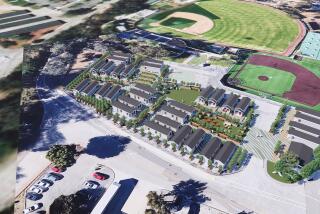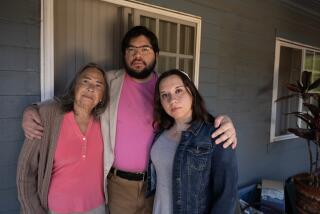A Dukakis win in Westwood
- Share via
Michael Dukakis lost his bid for president in 1988, but he can declare victory in his latest campaign -- against parking scofflaws in Westwood.
The former Massachusetts governor has been at the center of a more than two-year battle against the longtime practice of “apron parking” in the neighborhood west of UCLA known as North Village. There, parked cars spill out of apartment driveways and straddle sidewalks and streets.
“It’s a disaster,” said Dukakis, who teaches public policy at UCLA and lives part-time in the neighborhood. “Beyond being illegal, it’s dangerous. You get two SUVs with their rear ends sticking out into the street, and you end up with a one-way road. It’s time to end it.”
Los Angeles city officials are now listening to Dukakis and the other critics of apron parking. As soon as January, parking enforcement officers will begin aggressively ticketing cars that partly block streets and sidewalks.
The campaign is expected to leave many residents scrambling for parking. There are only 857 legal curb spaces in North Village, but about 5,700 vehicles belonging to residents. The demand gets far worse when students commuting to UCLA comb the streets for parking spots.
Though apron parking is illegal, Los Angeles officials have allowed the practice in the neighborhood for decades because of the parking crunch.
But Dukakis argues that apron parking is dangerous. He has pleaded his case to city leaders and even admonished parking enforcement officers on the streets.
Dukakis told one officer who was ticketing a car in the red zone that she was missing the other illegally parked cars down the street.
“I said, ‘You’re tagging this guy because he’s over the red line, but what about those 15 cars up there parked illegally?’ ” Dukakis said. “She said, ‘I know, but there’s not enough parking up here.’ ”
He told her that maybe those parked illegally should take the bus.
“She looked at me like I had 10 heads or something,” Dukakis said.
He first talked to city officials about the parking situation two years ago. Dukakis then turned to a colleague, UCLA urban planning professor Donald Shoup, author of “The High Cost of Free Parking.”
Shoup made the parking dilemma a project for his students. The result was “The Dukakis Project.”
“He was the inspiration, and it helps to have a big name on your side when you are tackling an issue such as this,” said Adina Ringler, a 26-year-old graduate urban planning student.
The study looked at the consequences and costs of the illegal parking and suggested solutions, including paid permit parking and curbside meters. But more important, the Dukakis Project prompted Shoup to send a letter to city officials that said that apron parking violated the Americans With Disabilities Act.
The letter got the city’s attention. The letter was sent to City Atty. Rocky Delgadillo, as well as to L.A. Police Chief William J. Bratton and Mayor Antonio Villaraigosa. The city then decided to crack down on apron parking.
“How would you like to be someone who is blind and using a stick, trying to get across those sidewalks?” Shoup said.
Councilman Jack Weiss said it was hard not to support the ban. “If [it’s] to comply with federal law, what’s the alternative?” he said.
The crackdown will hit hardest the students and others who live in the dense apartment buildings near UCLA.
Residents have turned apron parking into an intricately choreographed dance of cooperation and communication. A student attending class might leave extra keys behind so his car can be moved to let other vehicles out. Or another who vacates a spot might ask a roommate to park there until he returns.
Sarah Attensil, a 21-year-old UCLA anthropology major from Lancaster, said that at her apartment there was a schedule for who parks where.
“We’re very vocal about where we’re going and what time we’re getting back,” Attensil said. “Pretty much every morning we let everyone know.”
PC Zai, a 22-year-old psychology major, said apron parking was “considered so normal for so long, some landlords even charged tenants for those spots.”
The prospect of losing spaces leaves students with few options.
“People are really worried,” Zai said. “Students figure, ‘If I can pay for it and I have a car, I should be allowed to park here.’ That’s going to have to change.”
But Dukakis believes that the changes will make the streets around the campus safer.
“You can’t get fire equipment out there. Beyond that, you can barely walk on the sidewalk,” Dukakis said. “And for years, no one had done anything about it. It’s crazy.”
*
More to Read
Get the L.A. Times Politics newsletter
Deeply reported insights into legislation, politics and policy from Sacramento, Washington and beyond. In your inbox three times per week.
You may occasionally receive promotional content from the Los Angeles Times.











